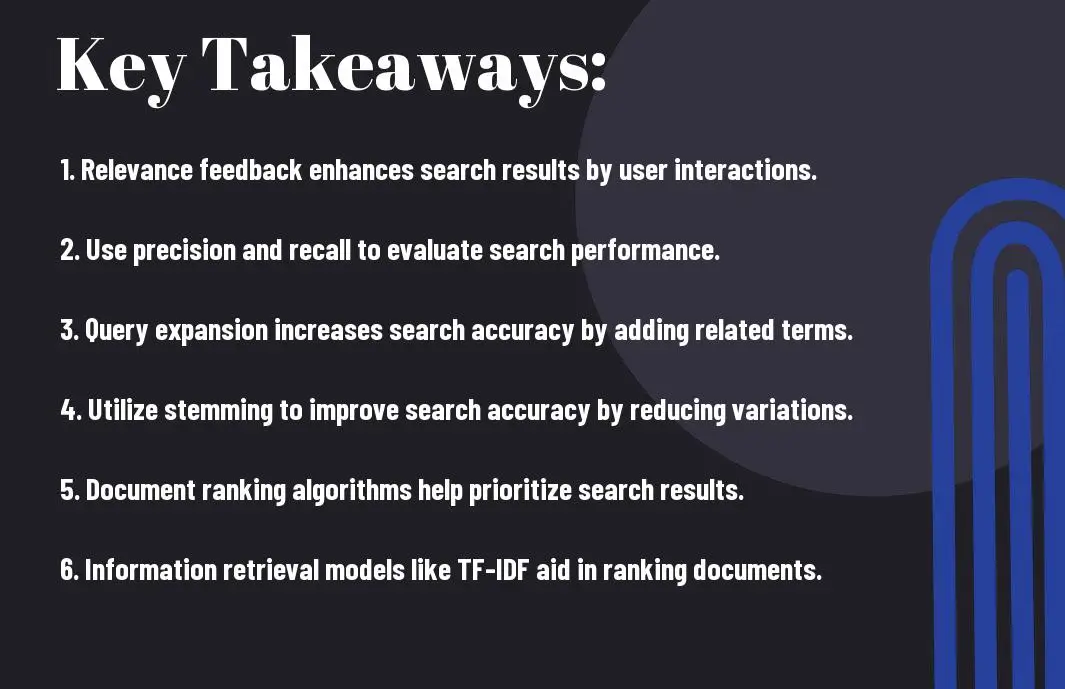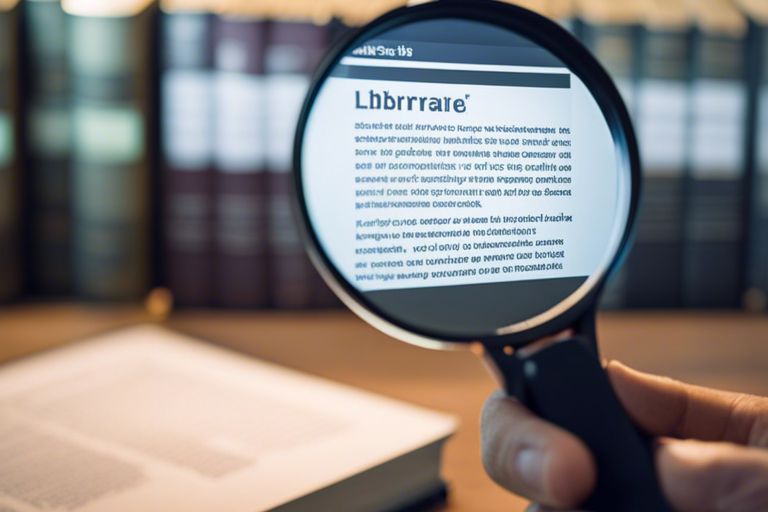Overwhelmed by the vast amount of information online, you often struggle to find exactly what you are looking for. In this article, you will investigate into the world of information retrieval to understand how search accuracy can be significantly improved. By mastering key techniques and strategies, you will be able to retrieve relevant information efficiently and precisely, enhancing your search experience.
Key Takeaways:
- Information Retrieval: Utilizing techniques such as keyword extraction and relevance ranking can significantly improve search accuracy by ensuring that search results are relevant to the user’s query.
- Machine Learning: Implementing machine learning algorithms can enhance search accuracy by learning from user behavior patterns and adjusting search results based on user preferences.
- Natural Language Processing: Incorporating natural language processing techniques can help improve search accuracy by understanding the context and meaning behind user queries, leading to more precise search results.
Fundamentals of Information Retrieval
Definition and Importance
To improve search accuracy with information retrieval, you need to understand the fundamentals. Information retrieval is the process of accessing and retrieving relevant information from a large collection of data. It plays a crucial role in various fields like academia, business, and research, helping you find the information you need efficiently.
Brief History and Evolution
On the journey to improving search accuracy, you should also explore the brief history and evolution of information retrieval. Information retrieval dates back to the 1950s, with the development of early retrieval systems like Cranfield experiments. Over the years, advancements in technology and algorithms have revolutionized how information is searched, retrieved, and presented to users.
Challenges in Search Accuracy
Noise and Irrelevance in Search Results
Now, with the vast amount of information available online, one of the major challenges in search accuracy is dealing with noise and irrelevant results in your search queries.
Limited Contextual Understanding
Results show that limited contextual understanding can lead to inaccuracies in search results. For instance, search engines may struggle to understand the context of a query, resulting in irrelevant or misleading results for you.
Handling Ambiguity and Uncertainty
Irrelevance in search results and errors due to ambiguity and uncertainty can hinder the accuracy of your search. It is crucial to employ advanced algorithms and techniques to address these challenges and improve the precision of search results.
Another key aspect is to incorporate natural language processing and machine learning models to enhance the search engine’s ability to interpret and provide relevant results based on the user’s intent.

Techniques for Improving Search Accuracy
Query Expansion and Refining
After entering a search query, sometimes the results may not be as relevant as you hoped. An effective way to improve search accuracy is through query expansion and refining. This technique involves adding synonyms, related terms, or refining your initial query to retrieve more precise and relevant results.
Relevance Feedback and User Interaction
User interaction plays a crucial role in enhancing search accuracy. By providing feedback on search results, you can help the system understand your preferences better. This could involve rating search results, marking certain results as relevant, or specifying your search criteria to refine future searches.
Refining your search through relevance feedback and user interaction can lead to significantly improved accuracy in retrieving relevant information. By actively engaging with the search results and providing feedback, you empower the system to better understand your needs and preferences.
Natural Language Processing and Semantic Analysis
The integration of natural language processing and semantic analysis enhances search accuracy by deciphering the meaning behind search queries. The system can analyze the context, intent, and relationships between words to deliver more precise results based on the user’s search query.
The use of natural language processing and semantic analysis not only improves search accuracy but also enables a deeper understanding of user queries and content. By interpreting language nuances and relationships between words, the system can provide more relevant and contextually appropriate search results.
Role of Machine Learning in Search Accuracy
Supervised Learning for Classification
Many machine learning algorithms play a crucial role in improving search accuracy. One popular technique is supervised learning for classification. This method involves training a model on labeled data to predict the category of new, unseen data. By utilizing supervised learning algorithms, you can enhance the accuracy of search results by categorizing and filtering relevant information.
Unsupervised Learning for Clustering and Dimensionality Reduction
On the other hand, unsupervised learning techniques like clustering and dimensionality reduction help in organizing data into meaningful clusters without predefined labels. These methods can assist in uncovering patterns and structures within the data, leading to more accurate search results.
Learning algorithms such as k-means clustering or principal component analysis (PCA) can aid in grouping similar documents together or reducing the complexity of the data, respectively. By utilizing these unsupervised learning techniques, you can enhance the accuracy of search results by discovering hidden relationships and patterns within the data.
Deep Learning for Semantic Embeddings
One crucial aspect of improving search accuracy is leveraging deep learning for semantic embeddings. This technique involves representing words or documents in a continuous vector space where semantically similar items are closer together. Through deep learning models like Word2Vec or BERT, you can capture the semantic meaning and context of words, enhancing the relevance and accuracy of search results.
Accuracy in search results is significantly boosted by deep learning models that can understand the underlying semantics and relationships within the data. By utilizing deep learning for semantic embeddings, you can improve the precision and relevance of search results, ultimately enhancing user experience.
Evaluation Metrics for Search Accuracy
Precision, Recall, and F1-Score
Metrics: Despite being fundamental evaluation metrics in information retrieval, Precision, Recall, and F1-Score play a crucial role in determining the search accuracy of a system. Precision measures the relevancy of the retrieved results, Recall assesses the completeness of the results, while the F1-Score balances between Precision and Recall, providing a single metric to gauge the overall performance of a search algorithm.
Mean Average Precision and Normalized Discounted Cumulative Gain
Recall: Mean Average Precision (MAP) and Normalized Discounted Cumulative Gain (NDCG) are advanced evaluation metrics that consider the ranking of search results. While MAP calculates the average precision at different recall levels, NDCG emphasizes the positions of highly relevant documents in the ranked list. These metrics offer a more nuanced understanding of how search algorithms perform under various scenarios.
Accuracy:
User-Centric Evaluation Metrics
Average: User-Centric Evaluation Metrics focus on assessing search accuracy based on user interactions and satisfaction levels. Metrics like Click-Through Rate (CTR), Dwell Time, and Task Completion Rate provide insights into how well the search system caters to users’ information needs and preferences. By incorporating user feedback, you can optimize search algorithms to deliver more relevant and satisfying search results.
Advanced Approaches to Search Accuracy
Unlike conventional search methods, advanced approaches to search accuracy utilize cutting-edge technologies to enhance information retrieval. Here are some innovative techniques that can improve the precision and relevance of your search results:
- Knowledge Graph-Based Search
Knowledge Graph-Based Search
Any search process can benefit from a knowledge graph-based approach. By organizing information into a structured graph format, you can uncover hidden relationships between entities, leading to more comprehensive search results that enhance your understanding.
- Multi-Modal Search and Fusion
Multi-Modal Search and Fusion
Fusion
Understanding the importance of integrating various types of data sources, multi-modal search and fusion techniques combine text, images, audio, and other forms of data to provide a more holistic and contextually rich search experience.
- Real-Time Search and Streaming Data
Real-Time Search and Streaming Data
Fusion
Search
Real-time search capabilities allow you to access the most up-to-date information available, while streaming data integration ensures that you are constantly informed about the latest developments. By leveraging real-time search and streaming data, you can stay ahead of the curve and make timely decisions based on the freshest insights.

Conclusion
Considering all points, improving search accuracy with information retrieval is crucial in today’s data-driven world. By implementing techniques such as natural language processing, machine learning algorithms, and semantic search, you can enhance the precision and relevance of search results. Recall, the more accurate and efficient your search process, the more productive and successful your information retrieval efforts will be.




